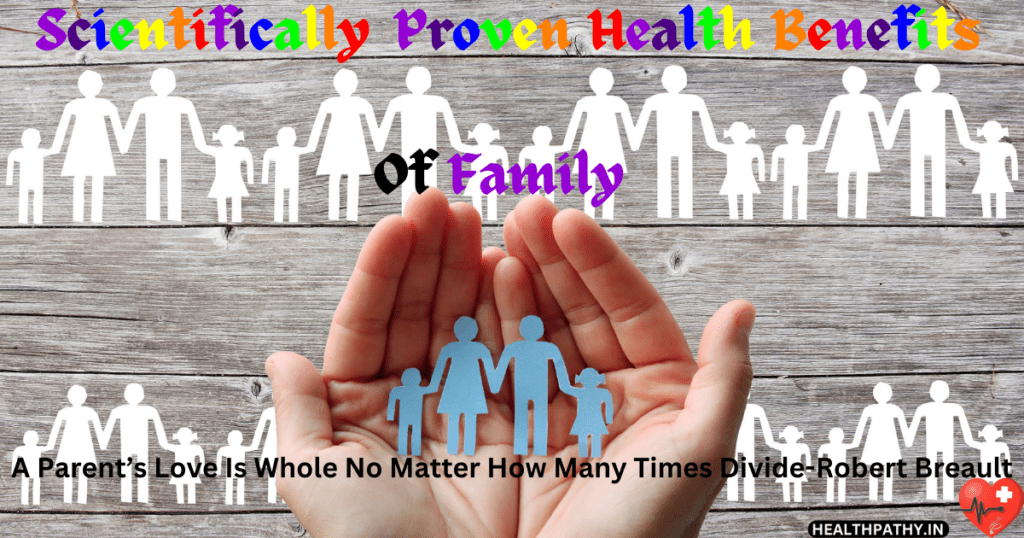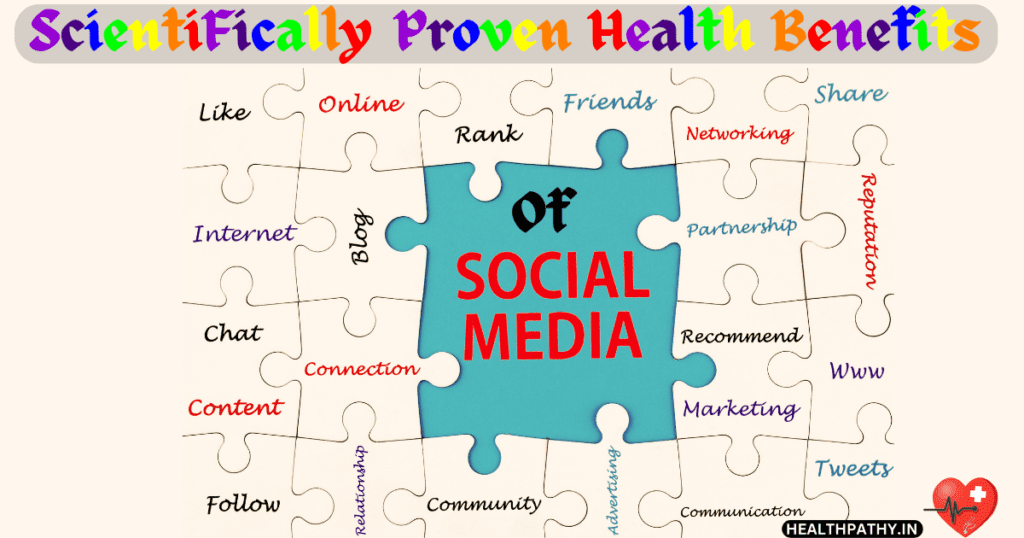Hello, I’m a homeopathic doctor with over 26 years of clinical practice, starting in 1997. My passion is to simplify complex medical concepts so that everyone can understand them. Join me on this educational trip as I examine the Scientifically Proven Health Benefits of Family in a way that everyone can relate to and understand. Let’s take a trip into the world of holistic health together!


Family Role In Health
Family plays a crucial role in an individual’s usual health and well-being. The assistance and dynamics within a family can appreciably affect physical, intellectual, and emotional fitness. Here’s how the circle of relatives contributes to health:
1. Emotional Support: Families provide emotional support at some point in difficult instances, inclusive of infection, loss, or stress. Having a close-knit family can reduce feelings of loneliness and improve ordinary intellectual fitness.
2. Stress Reduction: Strong family bonds can act as a buffer in opposition to stress and help in calm. Sharing concerns with family participants can alleviate pressure and improve intellectual health.
3. Healthy Lifestyle: Families can affect each other’s lives. Encouraging healthy habits, which include normal exercise and a balanced diet, promotes higher physical health for everyone.
4. Preventative Care: Family members regularly remind and guide each other in looking for preventative healthcare, including vaccinations and everyday checkups. This proactive approach can prevent critical fitness issues.
5. Genetic Information: Families share genetic records, which may be important for figuring out hereditary health risks. Knowing your own family’s scientific records can help in the early detection and prevention of certain conditions.
6. Caregiving: Families often tackle caregiving roles for ill or elderly members. This help is crucial for people with persistent illnesses or disabilities, making sure they receive essential care.
7. Mental Health: A supportive family’s surroundings can definitely affect mental fitness and give results as of meditation. Open communication and a safe area for discussing mental fitness-demanding situations can result in early intervention and treatment when needed.
8. Social Interaction: Families offer social interaction, lowering feelings of isolation and improving emotional well-being. Social connectedness is linked to better intellectual fitness.
9. Motivation: Family participants can motivate each other to set and acquire health-associated desires, whether or not it is quitting smoking, losing weight, or handling persistent conditions.
10. Life Satisfaction: Family contributes to standard lifestyle delight and happiness. Healthy family dynamics lead to better psychological well-being.
11. Child Development: For youngsters, a supportive circle of relatives is critical for their improvement. Positive family experiences contribute to higher academic performance, self-esteem, and emotional resilience.
12. Financial Support: Families frequently offer economic help in the course of emergencies that could prevent or alleviate fitness-related crises.
13. Longevity: Some research recommends that people with strong family ties tend to live longer, likely due to the emotional and realistic assistance they acquire.
14. Crisis Response: In times of personal disaster, family members often rally collectively to provide assistance, which may be a lifeline in the course of emergencies.
15. End-of-Life Care: Families play a great role in stop-of-existence care decisions and support, making sure that loved ones receive compassionate care and dignity.
It’s important to note that family dynamics in the article Scientifically Proven Health Benefits Of Family can also be a source of pressure and fitness challenges. Dysfunctional family relationships, struggles, or a lack of guidance can negatively affect fitness. In such cases, seeking professional guidance, which includes family counseling, can help improve relationships and typical well-being.
In short, a circle of relatives is an essential source of guidance and influence on an individual’s health. A healthy circle of relatives relationships provides emotional, bodily, and social blessings that contribute to higher ordinary health and well-being.


Effective Communication Among Family Members
Effective Communication Among Family Members is vital for maintaining healthy relationships and ordinary well-being. Here are a few key standards and tips for improving verbal exchange inside households:
1. Active Listening: Encourage family members to actively concentrate while someone is speaking. This approach gives them your full attention, preserving eye contact and no longer interrupting. It suggests appreciation and allows for the know-how of each individual.
2. Open and Honest Communication: Create an environment wherein family members feel secure sharing their thoughts and emotions without worry of judgment. Honest and open verbal exchange fosters agreement.
3. Respect Differences: Every member of the family is unique with their very own views and opinions. Respect these variations and avoid seeking to exchange or manipulate others.
4. Empathy: Try to understand the feelings and experiences of the circle of relatives. Empathizing with their feelings, even if you don’t agree, can cause better understanding and emotional support.
5. Use “I” statements: When discussing issues or conflicts, use “I” statements to express your emotions and wishes. For example, say, “I feel harm while…” as opposed to “You usually make me feel…”
6. Timing Matters: Choose the ideal time and place for essential discussions. Avoid bringing up sensitive, touchy topics during moments of stress or distraction.
7. Non-Verbal Communication: Be aware of non-verbal cues, such as body language and facial expressions, as they could often bring more than phrases. Encourage family contributors to explicit themselves with each word and non-verbal alerts.
8. Limit Distractions: During family discussions, reduce distractions such as TV, smartphones, or other electronic devices. Focus on the verbal exchange at hand.
9. Use Humor: Appropriately using humor can diffuse tension and make conversations more cozy. However, be sensitive to the timing and context.
10. Conflict Resolution: Teach family members healthful struggle resolution competencies. Encourage them to express issues flippantly, listen actively, and work collectively to discover solutions.
11. Family Meetings: Schedule ordinary family conferences to talk about essential subjects and percentage updates, and offer a platform for everybody to enter.
12. Boundary Setting: Clearly define boundaries within the family. Discuss personal space, obligations, and individual wishes to avoid conflicts.
13. Appreciation and Gratitude: Express appreciation and gratitude for each other’s efforts and help. Positive feedback enables the strengthening of family bonds.
14. Seek Professional Help: If your own family conflicts persist or are causing tremendous distress, don’t forget family counseling or therapy to deal with underlying problems and enhance communication.
15. Lead by means of an example: As a determined or elderly family member, lead by means of an example in terms of conversation. Your kids often study effective communication by staring at the way you interact with others.
Remember that improving family verbal exchange is an ongoing process. It takes time, staying power, and steady attempts from all family members. By fostering an environment of open, respectful, and empathetic conversation, families can fortify their bonds, remedy conflicts more efficaciously, and assist each other’s well-being.


Living With Parents
Living with an elderly dad and mom can be worthwhile and gratifying. It lets you offer assistance and care for your parents as they age, while additionally deepening your family bonds. Here are a few hints for dwelling with an older dad and mom:
1. Open Communication: Maintain open and sincere communication with your mother and father. Discuss their needs, worries, and options. Encourage them to express themselves and actively concentrate on what they have to say.
2. Respect Independence: While presenting help, respect your dad’s and mom’s independence. Encourage them to do responsibilities they may be capable of, as it can improve their shallowness and standard well-being.
3. Safety First: Ensure that the residing environment is secure for elderly individuals. This consists of putting in handrails, disposing of risks, removing hazards, and making essential domestic modifications to prevent accidents.
4. Healthcare Support: Help your parents control their healthcare needs. Keep track of physician’s appointments, medicinal drugs, and any particular fitness requirements they will have.
5. Emotional Support: Aging can be emotionally challenging. Offer emotional help, expertise, and empathy. Be affected and prepared to concentrate after they need to talk about their emotions.
6. Healthy Lifestyle: Encourage a healthy lifestyle for your mother and father, which incorporates a balanced food regimen, everyday workouts, and mental stimulation. Engage in those sports together to make it more fun.
7. Social Interaction: Help your parents maintain a social lifestyle. Please encourage them to connect with friends, attend social occasions, and engage in activities they enjoy.
8. Financial Planning: Discuss financial matters and assist your mother and father in handling their price range, making sure they have a relaxed economic future.
9. Legal Matters: Consider discussing legal troubles like wills, powers of attorney, and healthcare directives to make certain their wishes, and desires are reputable.
10. Respite Care: Caring for elderly parents can be physically and emotionally demanding. Don’t hesitate to search for respite care or assistance from healthcare experts while avoiding overwhelming yourself.
11. Maintain Your Own Well-Being: Don’t forget to take care of your own physical and emotional well-being. Ensure you’ve got time for self-care and entertainment sports to recharge.
12. Family Support: Involve different family members in supplying aid and care for your parents. Share responsibilities to save you from overwhelming yourself.
13. Adaptation: Be organized for converting wishes and roles as your parents age. Be flexible and adaptable in your caregiving methods.
14. Professional Help: Consider seeking help from domestic healthcare specialists or caregiver-guide corporations for steering and recommendations.
15. Quality Time: Spend satisfactory time together with your dad and mom. Engage in sports they revel in, reminisce, and create loved recollections collectively.
Living with an elderly dad and mom may be a rewarding and enriching experience. It lets you look back and create meaningful moments with your loved ones. With open conversation, support, and cautious planning, you may provide a secure and loving environment for your mother and father as they age.
Benefits Of Marriage In Health
The phrase “marriage” refers to the legally and socially identified union of individuals, generally in a dedicated and intimate relationship. It is an idea and group that varies across cultures and areas; however, it normally indicates the coming together of people in a proper, devoted partnership. Here is the key information about the term “marriage”:
1. Commitment: Marriage is a public announcement of a couple’s commitment to each other. It indicates their purpose in proportion to their lives and responsibilities.
2. Legal and Social Contract: In most societies, marriage is a legal and social contract. Legally, it presents positive rights and duties, which include inheritance, tax advantages, and the right to make clinical selections for a spouse. Socially, it frequently includes expectations and norms about the jobs of spouses.
3. Celebration: Marriage is frequently celebrated with a wedding ceremony, which could vary extensively in terms of traditions and customs. These ceremonies typically contain vows, jewelry, and the presence of family and friends.
4. Emotional and Intimate Bond: Marriage is often considered the most emotional and intimate bond between people. It’s a partnership constructed on love, agreement, and mutual help.
5. Legal Requirements: To marry, couples regularly ought to meet legal requirements, consisting of reaching a minimum age and acquiring a wedding license. The particular requirements can vary by means of place.
6. Monogamy: In most cultures, marriage is a monogamous organization, which means it includes the exceptional union of two people. However, polygamous marriages, wherein one man or woman is married to a couple of spouses, have been practiced in numerous cultures.
7. Cultural and Religious Variations: The concept of marriage varies significantly throughout cultures and religions. Different societies have exclusive customs, rituals, and expectations related to marriage.
8. Family Building: Marriage is often associated with the circle of family building. Couples may additionally select to have kids, and marriage affords stable surroundings for raising them.
9. Legal Protections: Marriage usually provides legal protections and blessings, consisting of access to health insurance and the right to make medical selections for one’s spouse. In a few international locations, same-sex marriage has been legalized to ensure the same rights.
10. Social Recognition: Marriage is not only a legal contract but also a socially diagnosed and revered institution. Being married often has a distinct social reputation compared to being unmarried.
11. Challenges and Changes: Marriages can face demanding situations and can trade over the years. Couples may work through difficult periods, are trying to find counseling, or even pick to end their marriage through a divorce.
12. Symbol of Love and Unity: Marriage is frequently visible as a symbol of affection and cohesion, symbolizing the dedication of two individuals to support and take care of each other during their lives.
Overall, marriage is a complex, complicated, and multifaceted concept that has advanced and been tailored to convert societal norms and values. While it may take one-of-a-kind paperwork, it continues to be a significant institution in lots of societies, representing the union of two individuals in love and partnership.


Marriage can have a vast impact on one’s health and well-being in various ways:
1. Emotional Support: Marriage regularly affords emotional guidance, which can assist people in coping with life’s demanding situations, lessen stress, and lower the danger of intellectual health problems like despair and tension.
2. Social Connection: Being devoted to dating can extend your social community. Social interactions are connected to higher mental and emotional fitness.
3. Reduced Risky Behaviors: Married individuals tend to engage in fewer risky behaviors together with immoderate drinking or drug abuse as compared to unmarried individuals, which could cause stepped-forward health outcomes.
4. Economic Stability: Marriage can result in greater financial stability as two individuals frequently pool their sources, which can reduce monetary strain and enhance typical well-being.
5. Healthy Habits: Spouses often impact each other’s behavior. This can cause the adoption of healthier behaviors like regular workouts, a balanced eating regimen, and preventive healthcare.
6. Longevity: Studies have shown that married people have a tendency to live longer and have a discounted risk of mortality compared to their unmarried counterparts.
7. Caring for Each Other: In sickness and fitness, married couples regularly provide each other with assistance during infection or health-demanding situations, contributing to better healing and ordinary well-being.
8. Intimacy: Physical intimacy within a conjugal relationship may have superb consequences for mental and bodily fitness, which include stress reduction and improved mood.
9. Purpose and Companionship: Marriage often provides individuals with a feeling of purpose and companionship, lowering feelings of loneliness and improving mental and emotional well-being.
10. Family Support: Being a part of a family unit can offer extra layers of aid, mainly when elevating youngsters or being concerned for aging mothers and fathers.
It’s vital to know that the quality of marriage plays a good role in its impact on fitness. A wholesome, supportive, and loving marital relationship is much more likely to have tremendous effects on well-being. On the other hand, unhealthy or annoying marriages can contribute to bad health effects.
Happy Couples: How To Keep Your Relationship Healthy
Building and retaining a wholesome and strong relationship between husband and spouse takes effort and dedication. Here are some tips to help foster an amazing court:
1. Effective Communication: Open, honest, and respectful conversation is fundamental. Discuss your thoughts, feelings, and issues regularly. Listen actively to each other.
2. Quality Time: Spend quality time collectively, doing things you each revel in. It’s vital to nurture your connection through shared experiences.
3. Respect and Empathy: Treat each other with respect and empathy. Try to recognize each other’s perspectives, even in disagreements.
4. Appreciation: Show appreciation for every difference. Small gestures of kindness and gratitude can give a boost to your bond.
5. Trust: Trust is the foundation of a strong relationship. Be dependable and straightforward in your moves and words.
6. Maintain Independence: While togetherness is critical, it’s also crucial to maintain your individuality and personal hobbies. Encourage each other’s personal growth.
7. Conflict Resolution: Conflicts are natural. Learn to clear them up in a healthy way that specializes in the difficulty and no longer attacks each personally.
8. Intimacy: Physical and emotional intimacy are important for maintaining a strong bond. Prioritize your bodily relationship and make certain it remains a source of connection and satisfaction.
9. Support Each Other’s Goals: Be supportive of each other’s aspirations and dreams. Help each other gain personal and shared goals.
10. Share Responsibilities: Share household responsibilities and childcare tasks equitably. This fosters a feeling of partnership and equity.
11. Forgiveness: Forgiving and letting go of grudges is crucial. Holding on beyond mistakes or grievances can erode the connection.
12. Keep Romance Alive: Continue to court each other even after marriage. Surprise each other with romantic gestures and date nights.
13. Shared Values: Make positive your proportion center values, or when you have differences, discuss a way to navigate them in your relationship.
14. Plan for the Future: Discuss your lengthy-term goals and plans as a couple. This can assist in creating a feeling of harmony and cause.
15. Seek Help if Needed: If you’re going through large, demanding situations in your relationship, remember to seek the help of a couples therapist or counselor. They can offer steerage and equipment to enhance your connection.
Remember that no relationship is ideal. It’s normal to have ups and downs. The secret is to work through challenges collectively and preserve investment within the relationship. Building a strong and lasting connection takes effort and time from each companion. These are all Scientifically Proven Health Benefits Of Family which I try to explore. I hope you like them and share them with your circle.
Must Read:
Scientifically Proven Health Benefits Of Sleep
Scientifically Proven Health Benefits Of Yoga
Must Watch:
Homeopathy VS Allopathy_A Balance Comparison
Saturday 26 April 2025 10:20:48:PM
- Acromegaly Cures With Scientifically Proven Homeopathy - 8 February 2024
- Acidity Cures With Scientifically Proven Homeopathy - 1 February 2024
- Appendicitis Cures With Scientifically Proven Homeopathy - 27 January 2024




